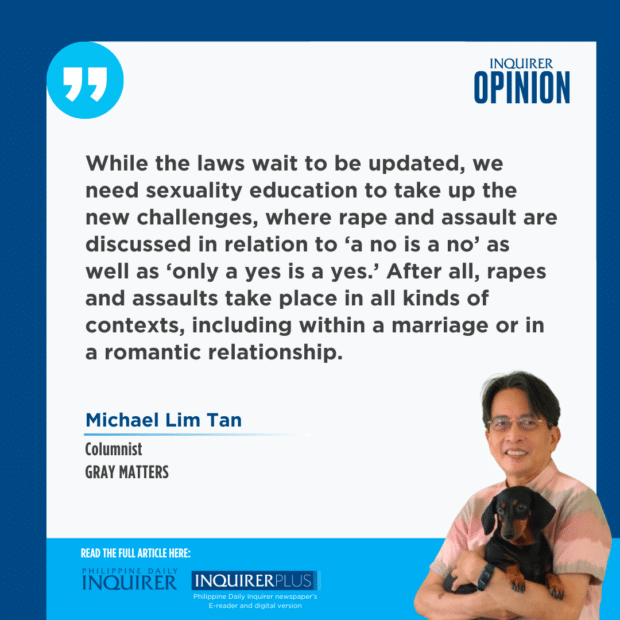
It was encouraging to read that the Department of Justice and the University of the Philippines’ College of Law have signed an agreement to “revitalize” the country’s criminal or Penal Code, which would consolidate a code signed into law in 1930 and since supplemented by about 10,000 other laws.
I’m hoping it will not just be consolidating the various laws, but will actually revisit and redefine many of the “crimes.”
Quite urgently, I hope that the review will give special attention to our laws on sexual assault and rape. The last revision of an anti-rape law was in 1997, which has progressive provisions such as the recognition of marital rape, where a wife or husband can file charges, as well as some archaic ones, notably a provision that allows the rapist to marry the person he raped, with the result that the rape charge is dismissed, together with the penalty imposed.
There is another urgent issue that is not adequately addressed in the revised Anti-Rape Law of 1997 and this is the matter of consent. Article 266-A of the law names the conditions that constitute rape, one of which reads: “When the offended party is deprived of reason or otherwise unconscious.”
The need to clarify this issue of consent was highlighted by the recent case of Gisele Pélicot, a French woman who between 2011 and 2020 was raped by her husband, Dominique, as well as more than 50 men that he invited, through an internet site, to their conjugal home. Dominique Pélicot drugged his wife and invited the men over to rape her while she was unconscious. He also videotaped the assaults, the voluminous tapes, complete with labels, found by police who raided his home after he was arrested for “upskirting,” or taking photos or videos up a woman’s skirt without their permission.
In December, Dominique Pélicot was found guilty of raping, drugging, and videotaping his now ex-wife (she divorced him after he was arrested and charged). The other men were given shorter sentences even as several of them denied having raped Gisele Pélicot, claiming that they thought she was merely asleep. During those years of the rapes, Gisele Pélicot would wake up without any memories of the assault, thinking that her fatigue and memory lapses were due to dementia. (Gisele and her husband are both 72.)
The case received international attention especially because Gisele Pélicot asked that the trial be made public, declaring that “shame should change sides,” referring to the way rape trials often become ordeals for the women who were assaulted rather than the rapist.
Large numbers of women showed up at the trial to show their support for Gisele, with signs like “rape is rape.” The women’s groups also referred frequently to Spain’s “ley solo si es si,” or “only a yes is a yes” law passed in 2022, emphasizing that without consent, there is sexual assault, if not rape.
Our revised anti-rape law is still unclear when it refers to the offended party being “deprived of reason or otherwise unconscious,” especially because in countries like the Philippines, the rich can easily find a lawyer who can drag the case, quibbling on technicalities and semantics.
We need to look at what international organizations call “chemical submission,” referring to the use of psychoactive substances for criminal purposes by making it difficult for a person to act rationally and to defend herself or himself. Crimes include sexual assault, robbery or extortion, and maltreatment of minors and elders. There is a wide range of chemicals that have been documented, from alcohol to tranquilizers and sedatives. The recent case of a young actor alleging he was drugged and raped by two male contractors in the entertainment industry is another example of the need to address the issue of consent in the context of chemical submission.
We might want to look to countries for examples of anti-rape laws that are explicit in addressing consent. In November 2024, the son of Norway’s crown princess was arrested for violating a law on “sexual intercourse with someone who is unconscious or for other reasons is unable to resist the act.” This is important because perverse lawyers could argue that a drugged or unconscious person cannot be raped because she or he is unable to resist.
Meanwhile, while the laws wait to be updated, we need sexuality education to take up the new challenges, where rape and assault are discussed in relation to “a no is a no” as well as “only a yes is a yes.” After all, rapes and assaults take place in all kinds of contexts, including within a marriage or in a romantic relationship.
—————-
mtan@inquirer.com.ph

